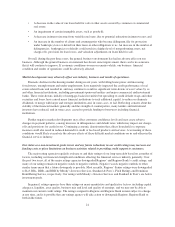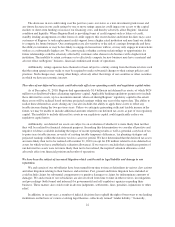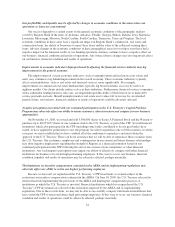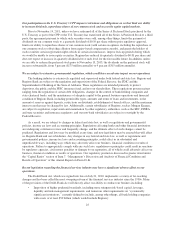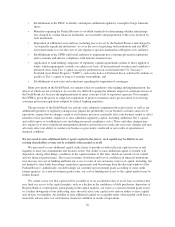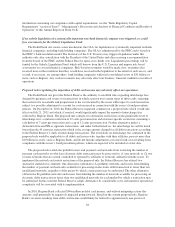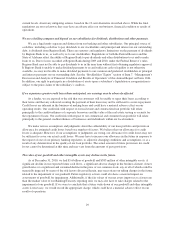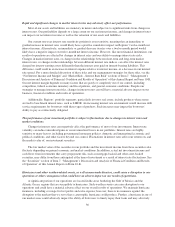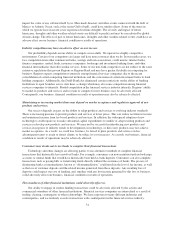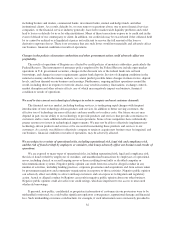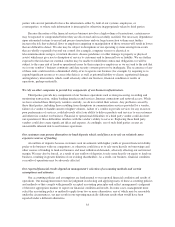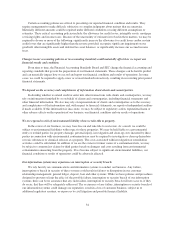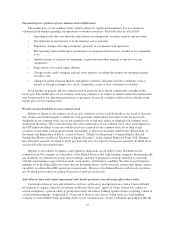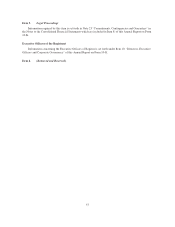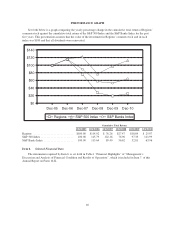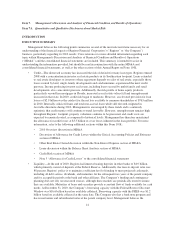Regions Bank 2010 Annual Report Download - page 45
Download and view the complete annual report
Please find page 45 of the 2010 Regions Bank annual report below. You can navigate through the pages in the report by either clicking on the pages listed below, or by using the keyword search tool below to find specific information within the annual report.impact the value of any collateral held by us. Man-made disasters and other events connected with the Gulf of
Mexico or Atlantic Ocean, such as the recent Gulf oil spill, could have similar effects. Some of the states in
which we operate have in recent years experienced extreme droughts. The severity and impact of future
hurricanes, droughts and other weather-related events are difficult to predict and may be exacerbated by global
climate change. The effects of past or future hurricanes, droughts and other weather-related events could have an
adverse effect on our business, financial condition or results of operations.
Industry competition may have an adverse effect on our success.
Our profitability depends on our ability to compete successfully. We operate in a highly competitive
environment. Certain of our competitors are larger and have more resources than we do. In our market areas, we
face competition from other commercial banks, savings and loan associations, credit unions, internet banks,
finance companies, mutual funds, insurance companies, brokerage and investment banking firms, and other
financial intermediaries that offer similar services. Some of our non-bank competitors are not subject to the same
extensive regulations that govern Regions or Regions Bank and may have greater flexibility in competing for
business. Regions expects competition to intensify among financial services companies due to the recent
consolidation of certain competing financial institutions and the conversion of certain investment banks to bank
holding companies. Additionally, the Dodd-Frank Act eliminated certain restrictions on the ability of banking
institutions to open branches across state lines, a change which may also cause competition among financial
services companies to intensify. Should competition in the financial services industry intensify, Regions’ ability
to market its products and services and to retain or compete for new business may be adversely affected.
Consequently, our business, financial condition or results of operations may also be adversely affected.
Maintaining or increasing market share may depend on market acceptance and regulatory approval of new
products and services.
Our success depends, in part, on the ability to adapt products and services to evolving industry standards.
There is increasing pressure to provide products and services at lower prices. This can reduce net interest income
and noninterest income from fee-based products and services. In addition, the widespread adoption of new
technologies could require us to make substantial capital expenditures to modify or adapt existing products and
services or develop new products and services. We may not be successful in introducing new products and
services in response to industry trends or developments in technology, or those new products may not achieve
market acceptance. As a result, we could lose business, be forced to price products and services on less
advantageous terms to retain or attract clients, or be subject to cost increases. As a result, our business, financial
condition or results of operations may be adversely affected.
Consumers may decide not to use banks to complete their financial transactions.
Technology and other changes are allowing parties to use alternative methods to complete financial
transactions that historically have involved banks. For example, consumers can now maintain funds in brokerage
accounts or mutual funds that would have historically been held as bank deposits. Consumers can also complete
transactions such as paying bills or transferring funds directly without the assistance of banks. The process of
eliminating banks as intermediaries, known as “disintermediation,” could result in the loss of fee income, as well
as the loss of customer deposits and the related income generated from those deposits. Any resulting loss of
deposits could impact our cost of funding, and, together with any lost income generated by this loss of business,
could adversely affect our business, financial condition or results of operations.
The soundness of other financial institutions could adversely affect us.
Our ability to engage in routine funding transactions could be adversely affected by the actions and
commercial soundness of other financial institutions. Financial services companies are interrelated as a result of
trading, clearing, counterparty or other relationships. We have exposure to many different industries and
counterparties, and we routinely execute transactions with counterparties in the financial services industry,
31


